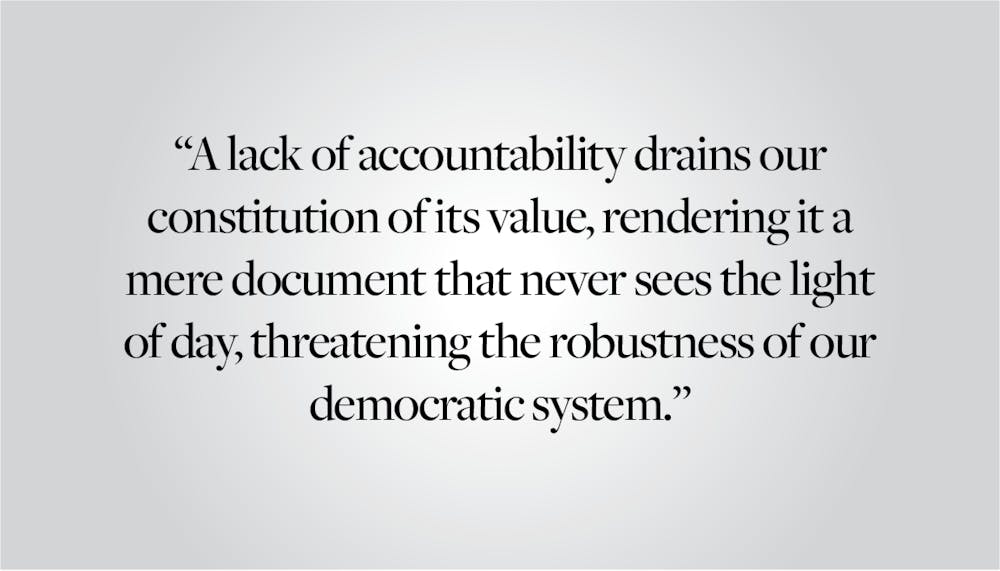It has been a year since the chaotic and unconstitutional spring election for the Undergraduate Council of Students presidency. To summarize, the Student Government Association declared Chas Steinbrugge ’24, who secured only 34.45% of the vote, president over Ricky Zhong ’23, who got 32.90%, when in fact the election should have gone to a runoff under UCS bylaws. After Zhong fought for and was granted a runoff election, he won with 63.42% of the vote. Throughout this process, Instagram was flooded with posts comparing candidates to Trump, comments implying the election had been rigged, and various criticisms of UCS’s election procedures. This showcased how Brown’s microcosm of politics is highly vulnerable to the same problems of declining civility, populism and institutional fragility that we see on a national level. For this reason, UCS must remain diligent as it executes this year’s election — and we must keep it accountable for doing so. Looking to the future, we can no longer assume the resilience of our student democracy and must move forward acknowledging its fragility.
After the recall had been announced, The Herald published an editorial titled “Broken elections, broken UCS,” highlighting how “nobody seems to know what the rules are,” even UCS members. That said, this mismanaged election was not a singular, isolated failure — it was the product of an accumulation of shortcomings on UCS’s end. This began in fall 2021, when all three branches of student government formed SGA to streamline communications between groups. SGA decided to standardize the elections procedures on campus, but these regulatory changes were never fully implemented across all branches. This lack of coordination ultimately ended in chaos, with President Christina Paxson P’19 P’MD’20 eventually stepping in to issue guidance. In effect, the premise of student self-governance failed.
Of course, UCS representatives and Brown students care about upholding democratic norms, but democracy is not sustainable by sentiment alone without proactive practices for good governance. Though the failure of the 2022 UCS election did not reflect an intentional violation of rules, it was nonetheless an inexcusable dereliction of duty from UCS, seemingly brought on by indifference and an exhaustion with the bureaucratic procedures of the UCS constitution, election codes and bylaws.
A steadfast commitment to democracy is often unglamorous, requiring regular, day-to-day governance that is not always visible to the public. Despite the lofty language we often use to describe democracy, it runs on countless pages of regulations that need diligent reference and maintenance. Even if it is boring, difficult or cumbersome, meticulous rule-following must inform all decision-making, especially electoral processes, to sustain just and fair institutional practices.
Failure to adhere to the UCS constitution and its principles has eroded trust in democratic institutions and has contributed to democratic backsliding. When Steinbrugge posted the runoff results on his meme account, conceding the election to Zhong, students filled the comment section with doubts about the credibility of the runoff outcome, claiming that the election had somehow been rigged. One commentator suggested that the 48% increase in student participation for the runoff was itself suspicious, neglecting the likely explanation that campus discussions of the drama drove up turnout in the second round. It is concerning that some students had become so disillusioned with the system that an increase in voter turnout, an objective success, was evidence of impropriety. Ultimately, because UCS ignored constitutional rules, conspiracies and populist sentiments penetrated our campus and have left a lasting impact.
Why is it that disasters are what bring awareness to flaws in our institutions? A constitution is not merely a tool to found a democratic institution but a constant presence that helps it respond to threats. Our constitution should inform all UCS decisions, even student initiatives that are less prominent than elections. Thankfully, UCS has started to take actions along these lines, such as bringing on elections chairs for both UCS and SGA to “manage the UCS, UFB and CCB elections to ensure fair and impartial elections, publicize and increase turnout for elections and periodically review UCS elections code and (recommend) updates” — a structural change we can be optimistic about.
Going into this election cycle, we must remember that UCS has overlooked electoral procedures in the past and we must insist it properly conducts this year’s election. A lack of accountability drains our constitution of its value, rendering it a mere document that never sees the light of day and threatening the robustness of our democratic system. Laws may carry the best intentions, but if they go unimplemented, violations will persist as if they are not violations in the first place.





